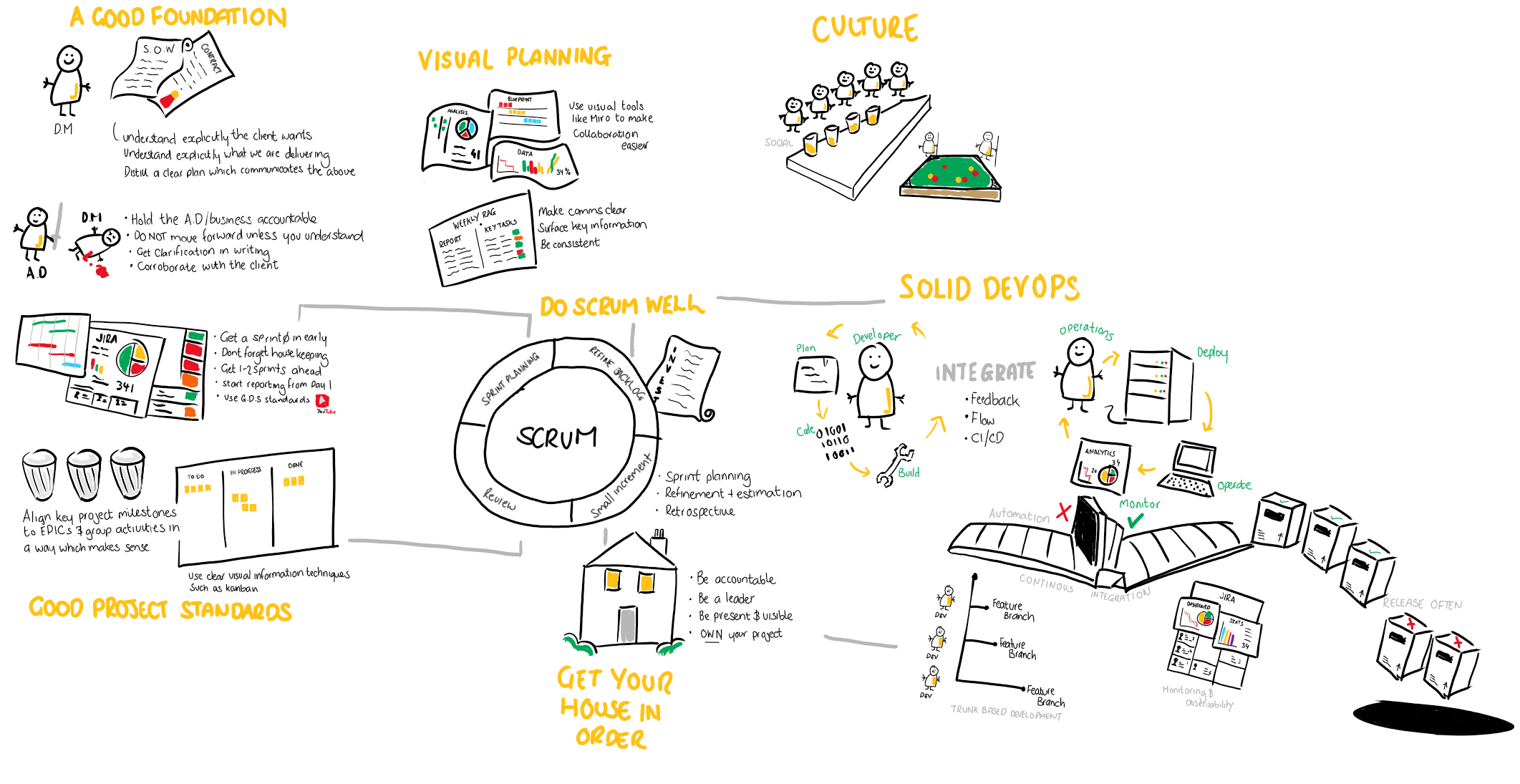How to be a good Agile Delivery Manager
Got your attention? Good! – I’m writing about being a good DM again (last post here) because I have literally 3-5 conversations a week on the same subject across all the companies I work for or advise. I thought I’d come at the subject from a different angle this time. Three key things for you to think about.
But before that, a bit of history & popular thought along with my predicted client demands for 2021 – a DM is just a made up role, & no one really knows what it is. A project Manager? Nope. A Scrum Master? Nope? What then? Go & read Mark Stanley’s account of what being a good DM is, although from 2012, his article still holds fruit in my opinion. And to those nay’sayers who think DM isnt a thing – well, you’re wrong. Maybe! 😊
Client demands to consider post COVID
So many clients have now ‘done’ their transformation or are at that 18 month period of change. They have migrated workload into the cloud, containerised everything (although all they’ve done is duplicate their physical on-prem environments with virtual equivalents along with the inefficiencies), , they have become ‘Agile’ (lol) & they are now running software delivery they never knew they would be doing – they are all now stuck wondering – well, ‘what do we do now’.
This is where quality consulting comes in, & the DM is at the forefront of that. Learn your clients challenges, what they are facing as business operators, how COVID has impacted them, their needs for the next 3 years or more, & really think deeply about the part you play in that when you’re delivering a project for them.
There’s two videos I’d really like you to watch to prepare for this post;
The first, which sums up pretty much my relationship with Agile over the years:
The second, is about Air plane crashes, (bare with me):
Three top things to consider to help develop your Digital Delivery Management Experience (in my opinion)
So this post is about project delivery, & what makes a good catch-all standard. Yes, I know there are nuances & details in each project which make some of this advice & guidance not applicable but mostly, these are the things I recommend Delivery Managers not only follow & do, but ask themselves which are the bits missing. Then double-down on those specific things.
Some common rebuttals I often have from folk include:
- That won’t work here
- Yeah, in theory its great but practically it’s not feasible
- The client wants it this way
- I’m not in control of everything, I’m given the project in its’ current state – i.e on fire
- No one is doing their job
The lists endless…………And look, I get it, I really do and one size doesn’t fit all BUT you have to have a standard. A personal standard of excellence, with which you will not compromise. I think there’s something fundamentally wrong if anyone is prepared to compromise on their own personal standards AND here’s the good thing –you get to pick & choose whatever personal standards you want to adhere by. Look I’m not saying either to throw around a diva-esque strop every time you don’t get your own way, (you’re not me, I’m so precious!) but being a good leader is about how you can move & shake within the constraints of your organisation or project, and if you don’t have them skills, it’s on you to develop them.

- Understand the world around you (& accept some cold hard truths)
Try & step back for just two minutes. Outside of what you’re job is, and maybe what you’re trying to deliver & ask why are you doing it? But not only ask why, but think about the impact it’ll have if it goes well or not? Are you part of a massive machine, your project just an excuse to exhaust some allocated budget? Or does it exist to actually do something productive? What about peoples motivations? Why are they in it? Do they care? Why does the project exist in the first place? Do you actually understand the project or are you going through the motions? Who is pumped for the project, who isnt? Why? Culture? Politics? Mixed supplier landscape?
Here’s a hard truth. No matter what level of woke’ness the world evolves into, you will never change the base rules of engagement for human beings & how to be awesome in most roles. How you are as an individual will have the single-biggest impact on your project regardless of technical ability, competence or anything else. You HAVE to be good with people. Even those you don’t get along with.
Those who can genuinely build & forge relationships, even with the people they don’t like, & who in turn can exist in, operate in & mix with others from all types of backgrounds, context, organisations, creed, capability – those people will win. Emotional resiliency, emotional consistency & being aware of the shadows you cast are all key skills. And reality-check – most people are no way near as good with people as they think they are. We hear don’t we, the characteristics which make up being ‘good’, as a person – things such as honesty, openness, humility, respect, positivity, drive, fairness, inclusive – but how many of those are you really good at? Because you’re probably stuffing your project up not because you don’t know your way around a KanBan board or can’t do Devops, its most likely because you can’t wrangle a difficult stakeholder, or lead a team, or deal with conflict or have difficult conversations.
So in summary, I’d start with refining those skills. Then refine them some more. When you’ve done that, yep, go & do it again.
- The right environment – YOU ARE the environment
As a DM, you have more control over the environment your team works in than you think. Even if you don’t see yourself as leader, the very definition of your role-title means people will look to you both as a barometer of what’s the lay of the land, but also how they should themselves behave. The best teams encourage each other to take risks & don’t punish those who dare ask a question or offer up a new idea. Google’s project Aristotle found the answer to the question of which teams are the most effective, well, those with higher amounts of psychological safety.
So how can DM’s create this atmosphere, I think there’s actually three academic things but f-that, here’s what I think
- Put your hand up & show some humility yourself – saying I don’t know is fine, peoples bull-shit radar is highly tuned
- Stand your ground with your org & client – if you’re pushed into doing something sub-optimal, be very clear & loud about the way you challenge on this for you, the client & the team
- Be clear – you’d be amazed how many people think they are good at communicating & actually are not. Check your team, ensure they know why they exist, what they are doing & why.
On top of that, remember YOU are the environment. How you behave, react, your consistency with pressure, calamity, issues, team problems, & even when everything is going well – you have just as much impact on the environment you are in than whether you office has enough 55” Microsoft Surfaces.

- Be more of a do’er than a say’er
As the world (although often more broadly cyclical as it has ever been in terms of trends, transformation, client needs etc) becomes more complex, I find true value often can be extracted by those who can do. We’re all (even me) Powerpointed to death about Agile this, delivery that, & clients even more so. They meet Management Consultant presentations often with the enthusiasm of someone waiting to have a root canal, so eliciting excitement, drive, inspiration & motivation often comes from doing. A good showcase, practical show pony lighthouse demo, can work wonders.
Talking about demand management? Why not demonstrate how demand management can be automated using the client tools & arrange a practical demo. Trying to instil good behaviour in Jira? Starts with you. Need to show how you can use Microsoft Flow & Power-automate to set up some slick desktop automation? Don’t ask for permission, just do it. Heck, set up a VM & buy your own subscription – but show by doing rather than talking, & you will have much more impact.





